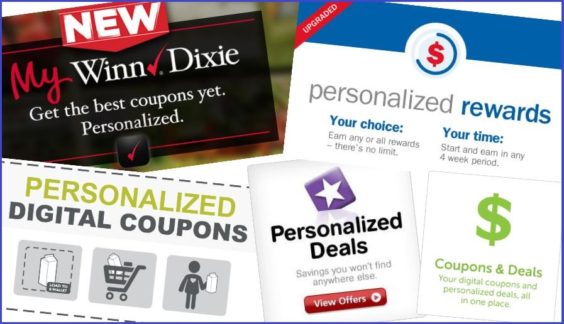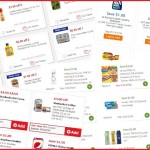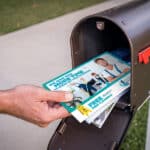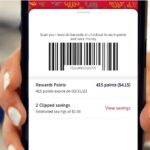
The days of one-size-fits-all promotions are over, we’re told. Personalization is the new name of the game, with specific coupons tailored to our purchase history more likely to get our attention, and our business.
Except a new study says that personalized coupons don’t really work.
Oh, they work for shoppers. Who doesn’t like getting discounts on things they regularly buy? And they work for retailers – shoppers who get personalized offers from their favorite store are likely to return in order to use them, and buy even more things while they’re there. But for manufacturers, personalized coupons may not be so effective. They merely give away discounts on things shoppers were going to buy anyway, and don’t necessarily impact their purchase decisions.
And if manufacturers decide personalized coupons aren’t worth it to them anymore, you may no longer receive any from your favorite store at all.
Those insights are contained in “Which Categories and Brands to Promote with Targeted Coupons to Reward and to Develop Customers in Supermarkets,” a research article to be published in an upcoming edition of the Journal of Retailing. The authors argue that personalized coupons are far more beneficial to stores, than brands. “The retailer has strong incentives to encourage the issuance of coupons to regular buyers of the brand despite the small potential to generate incremental sales for the manufacturer,” they write.
The study identifies two different types of personalized offers – “rewards” that offer discounts on brands that you already buy, and incentives that try to get you to buy different brands. The researchers analyzed the results of nearly a thousand checkout coupon campaigns at a mid-sized supermarket chain that issued both types of coupons.
What they found was that reward coupons were popular, but not all that effective, while incentive coupons were often just ignored.
If you’re a die-hard Coke fan, a coupon for Pepsi probably isn’t going to entice you to switch. And you’re certainly not likely to go for a lesser-known brand like RC Cola just because you can get a discount on it. So retailers would do well to offer coupons in categories where there’s not strong brand loyalty. “The coupons with higher promotional response belong to categories that are popular, easy to store,” and come in few varieties, the researchers write. “It is also better to promote leading brands.” Otherwise, these “personalized” coupons may never get used at all.
As for reward coupons, shoppers are more likely to redeem them “in categories with short purchase cycles that are also frequently on sale.” And the coupons don’t have to be very high in value, in order to get recipients to use them. If it’s something you regularly buy anyway, there’s really no reason not to use a coupon if it’s given to you.
But a high redemption rate doesn’t necessarily make for a successful coupon campaign. Coupons for items “that are purchased frequently are unlikely to generate a sales lift, despite higher coupon redemption rates,” the report reads. So the evidence shows that shoppers really are prepared to buy their favorite items anyway, even without a coupon. A personalized coupon is just a nice bonus that’s coming right out of the manufacturer’s pocket.
That’s good for retailers – a personalized coupon encourages regular brand buyers to buy that item at their store instead of somewhere else. And it can generate positive feelings about the store and help generate return visits. But the benefit to brands is questionable. “Manufacturers financing these types of promotions should be ready to negotiate, as retailers have strong incentives to encourage the issuance of coupons to regular brand buyers despite their uncertain potential to generate additional sales for the manufacturer,” the report reads.
It would certainly seem preferable to receive coupons for things you already buy, and things you might want to buy, than having to wade through hundreds or thousands of irrelevant offers. But those irrelevant coupons might actually prove to be better for those who issue them – and, ultimately, better for you.
The research firm TABS Analytics criticizes the “massive expansion of low-impact loyalty card and digital coupon programs at the expense of old-school vehicles such as circulars and Sunday coupons.” Those “old-school vehicles are still more popular to consumers and more impactful to sales” – and much less expensive, too.
So if a manufacturer knows it doesn’t have to offer you a very high-value reward coupon in order to get you to use it, you might actually find a better deal if you look in the one-size-fits-all Sunday coupon inserts. The coupons there might be more valuable, because the coupon issuers don’t know if you’re a regular brand buyer or not. And if coupon issuers are going to expend time and effort to offer you personalized incentive coupons on things you have no intention of buying, they might as well just print them in the Sunday inserts in order to achieve the greatest reach and generate the greater return on investment.
Personalized coupons may have some promise. But when it comes to the impact of old-fashioned impersonal offers, it may well turn out to be true that the less coupon issuers know about you, the better – for everyone involved.











Personalized offers instead of the send and pray solution of the old print model is a night and day step forward. Imagine a world where instead of pushing offers that are personalized, delivering requested offers. The personalized push notifications fail because they speak to what the distributor wants to push not what the consumer wants. Look at amobilecoupon . com they are a pure pull technology that delivers coupons for the product the consumer wants when and where they want in the grocery store at the time of decision for that shopping experience. Milestones reached by this company means that they will be coming to service grocery stores across the USA shortly.
One thing I have seen work real well on the incentive side is offering the store brand product free if you buy your existing brand you are loyal tos. For example Stop and Shop in the past offered a free Stop and Shop Mustard when you bought one French’s Mustard. This does tend to get people to at least try the product.
Rather interesting. I have found that the personalized coupons I use at Safeway tend to be Safeway store brand coupons. That is definately good for Safeway. Now I have to go look at the Safeway list of coupons this week, and see if there is much brand coupons in the first group which is the personalized coupons.